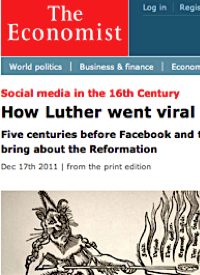
In last Saturday’s print edition of The Economist magazine (left), staff writers attempted to compare today’s Internet with the publication of Martin Luther’s 95 Theses in 1517. Claiming that by nailing his complaints onto a bulletin board, Luther started the Reformation. This was done, according to The Economist’s rewriting of history, “when Martin Luther and his allies took the new media of their day — pamphlets, ballads and woodcuts — and circulated them through social networks to promote their message of religious reform.” From there the article concentrates on the alleged “social network” that Luther had to promote his views, rather than on the message — the information — contained in those views:
In December 1517 printed editions of the theses, in the form of pamphlets and broadsheets, appeared simultaneously in Leipzig, Nuremberg and Basel, paid for by Luther’s friends to whom he had sent copies. German translations, which could be read by a wider public than Latin-speaking academics and clergy, soon followed and quickly spread throughout the German-speaking lands. Luther’s friend Friedrich Myconius later wrote that “hardly 14 days had passed when these propositions were known throughout Germany and within four weeks almost all of Christendom was familiar with them….”
Unlike larger books, which took weeks or months to produce, a pamphlet could be printed in a day or two. Copies of the initial edition, which cost about the same as a chicken, would first spread throughout the town where it was printed. Luther’s sympathizers recommended it to their friends. Booksellers promoted it and itinerant colporteurs hawked it. Travelling merchants, traders and preachers would then carry copies to other towns, and if they sparked sufficient interest, local printers would quickly produce their own editions, in batches of 1,000 or so, in the hope of cashing in on the buzz. A popular pamphlet would thus spread quickly without its author’s involvement.
The history provided by The Economist is accurate so far as it goes. Luther was grieved that the church was selling indulgences (the sin of simony, according to church teaching) with his Archbishop Albert of Mainz taking part of the proceeds to pay off a debt he incurred to purchase his rank, and Luther wanted a public debate on the matter. He wrote to the Archbishop, with a copy to his own bishop of Brandenburg, and included 95 topics he wanted to discuss. This was no challenge to the church’s authority as much as a request for an explanation in public.
But when the content was made public, thanks to Gutenberg’s invention — the printing press — the thirst for truth was nearly insatiable. And it’s that truth about How the World Really Works that is driving today’s Internet, and it’s that truth that The Economist is trying so hard to avoid. So it deflects the reader onto a side issue: how the information is transmitted. Much of the article is devoted to “today’s online ecosystem of blogs, social networks and discussion threads.” Only at the end do the staff at The Economist suggest that the Internet phenomenon “could play a supporting role in precipitating a revolution,” but without explaining why.
Part of the answer is in knowing what The Economist really is, and why it would bother to rewrite history to misdirect its readers. And that information, thanks to the Internet, is now readily available. From public and easily verifiable sources one learns that The Economist is nothing more than a high-level mouthpiece for the Anglo-American establishment, which is exposed even more fully in James Perloff’s Shadows of Power.
The Rothschild Family has a seat at the head of the table of international financiers, and just happens to own a significant piece of The Economist. All of this was discovered with a few keystrokes, and without a supporting “social network” of “bloggers” providing direction.
Anthony Wile of The Daily Bell picked up on the magazine’s disingenuous article, noting, “The Economist is a mouthpiece for the Anglosphere power elite, the most elite in its arsenal. Its articles are focused on free-market and business issues only within the larger context of Western military and economic power.” (Emphasis added.) “We maintain that an Internet Revolution is taking place … but The Economist will only write about it within the context of ‘social media.’”
What The Economist is afraid of is not the revolution of communication provided by the miracle of the Internet, but of the substance provided by the alternate media that relentlessly and increasingly presents the other side of the elite’s promotions. The very last thing that is sought is any kind of revolution that might threaten the elite’s existence.
While it took hundreds of years for the impact of Luther’s objections to take hold, it took just three years from the start of the commercialization of the Internet in 1995 (the year the first sale on Echo Bay — later to become EBay — was completed) that the political power of the Internet as the “alternative media” began to be felt. Newsweek reporter Michael Isikoff had been investigating the relationship between Monica Lewinsky and then-President Bill Clinton for nearly a year, and his story was about to be published on Saturday morning, January 17, 1998. After listening to one of the taped conversations between Lewinsky and a friend, Isikoff’s editors decided to “spike” the story. Matt Drudge of The Drudge Report, an online news aggregator, learned of the decision to withhold the story, and ran his exposé with the headline: “Newsweek Kills Story on White House Intern: 23-Year-Old Sex Relationship with President,” which instantly, profoundly and permanently changed the perception of the Internet as an alternative to the mainstream media. By Sunday morning, so many individuals were seeking more information from Drudge’s website that it couldn’t handle all the traffic.
According to BBC News, “This may be the first time that a story of such consequence developed on the Internet. Love him or hate him, Matt Drudge’s report on the Clinton scandal is the most visible sign to date of the changing nature of journalism.”
With this new information provided by the Internet, the final choice lies, where it always has, in the hands of an informed electorate. Writing to William Charles Jarvis on September 28, 1820, Thomas Jefferson said:
I know of no safe depository of the ultimate powers of the society but the people themselves; and if we think them not enlightened enough to exercise their control with wholesome discretion, the remedy is not to take it from them, but to inform their discretion by education. This is the true corrective of abuses of constitutional power.
All that the Gutenberg press did then, and all that the Internet is doing now, is informing the people’s discretion. The rest is up to them. And that is why The Economist invested so much effort in its disingenuous article to throw its readers off the path to an accurate understanding the real power of the Internet.



